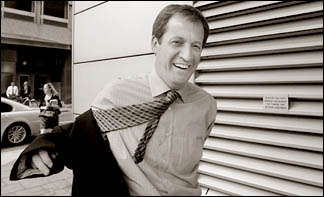Gleaning history from a Blair aide's diary
by SARAH LYALL
LONDON, Under attack for supporting America's hard-line stance
against Saddam Hussein, among other things, former Prime Minister Tony
Blair considered announcing in the fall of 2002 that he would not seek a
third term, his former spokesman said Monday. But Mr. Blair changed his
mind and convinced his wavering cabinet the following spring that the
impending invasion of Iraq was justified.
|

Alastair Campbell, former aide to Tony Blair, promoted his new
book about Mr. Blair's rise and early years in office in London
recently |
The revelation comes in "The Blair Years: Extracts from the Alastair
Campbell Diaries," a 757-page collection of diary entries written by Mr.
Campbell, who served until 2003 as the former prime minister's closest
adviser, spin doctor, hand-holder and policy enforcer.
Mr. Blair left office a few weeks ago, and by publishing now, Mr.
Campbell - known for his combativeness and short temper on behalf of his
former boss - says he is trying to ensure that his account of Mr.
Blair's early years in office is seen as immediate and authoritative.
The book will be published in the United States on July 31, by Knopf.
In the book, Mr. Campbell discusses Mr. Blair's dealings with Presidents
Bill Clinton and Bush; the prime minister's quiet dinners with Diana,
Princess of Wales, in the months before she died; the government's
efforts to discredit the BBC after it reported that the government had
relied on faulty intelligence to justify the war in Iraq; and the
divisions within the cabinet over Britain's decision to enter the war.
It also provides tantalizing tidbits about Mr. Blair's testy
relationship with the current prime minister, Gordon Brown, who served
as his chancellor of the Exchequer. In 1997, for instance, chaotic
scenes ensued after Mr. Brown told The Times of London that Britain
would not join the European Exchange Rate Mechanism - a revelation Mr.
Blair said he had not authorized his chancellor to make.
In another entry, Mr. Campbell describes how the health secretary,
Alan Milburn, "hit the roof" after Mr. Brown announced that the
forthcoming budget would include a review of inequalities in the health
service - having failed to check with Mr. Milburn first.
And in the fall of 1999, Mr. Campbell reports, Mr. Brown opposed
various personnel changes Mr. Blair made to the cabinet, warning the
prime minister "with a real hint of menace" in his voice that he could
expect "an avalanche of criticism."
"Well, make sure it's not from you," Mr. Blair replied, according to
Mr. Campbell. But Mr. Campbell has left out many of the juiciest details
about the bitter rivalry between the men, once close friends who tussled
for control of the Labor Party in 1994 (Mr. Brown resented his loss). In
a telephone interview, Mr. Campbell said he wanted to avoid unflattering
revelations about Labor infighting that the Conservative Party could use
to "make mischief."
"I've tried to show that there were tensions from time to time, but
not do it in a way where it dominates the narrative," he said.
The diaries also describe how, during a conversation in 1994 in which
Mr. Blair was telling Mr. Brown why he, Mr. Blair, should be the Labor
leader, Mr. Brown disappeared to use the restroom. He was gone so long,
Mr. Campbell reports, that Mr. Blair wondered if he "had done a runner."
The telephone rang. Mr. Blair let the answering machine pick it up,
only to hear a disembodied voice saying: "Tony. It's Gordon. I'm locked
in the toilet."
"They both ended up laughing about it," Mr. Campbell writes. "TB went
upstairs and said, 'You're staying in there till you agree.' "
According to government rules, Mr. Campbell's book was vetted by
various government departments, including Downing Street, which made him
take out "anything that was potentially harmful to Britain's interests,"
Mr. Campbell said.
He said he also followed Mr. Blair's wishes in deleting material
about other world leaders, based on the former prime minister's
"judgment of what they would have thought was appropriate or
inappropriate." Mr. Campbell provides an inside account of the internal
discussions leading up to Britain's decision to join the invasion of
Iraq.
Before the war, Mr. Blair genuinely believed that Saddam Hussein
possessed unconventional weapons. But he persuaded President Bush to
seek a United Nations mandate before invading, Mr. Campbell writes.
"As we left, Bush joked to me, 'I suppose you can tell the story of
how Tony flew in and pulled the crazy unilateralist back from the
brink,' " he writes.
Mr. Campbell, a former tabloid editor, is well known for the coarse
language, truculent manner and naked contempt he often displayed when
dealing with the news media while acting as Mr. Blair's spokesman. Few
newspapers have been kind about his book so far.
The Daily Telegraph attacked Mr. Campbell for contributing to what it
said was "the debauching of our democracy with an ethic of pathological
deceit."
"Slick presentation quickly turned to distortion, then to outright
mendacity," the newspaper said in an editorial. "Prevarication and
intimidation became the norms of political management."
The New York Times
|
